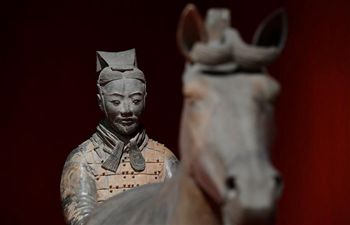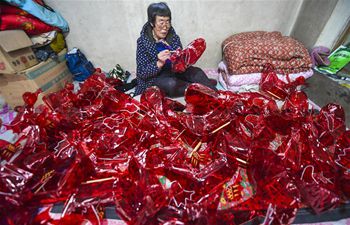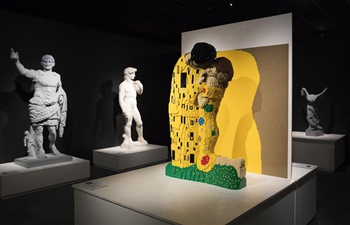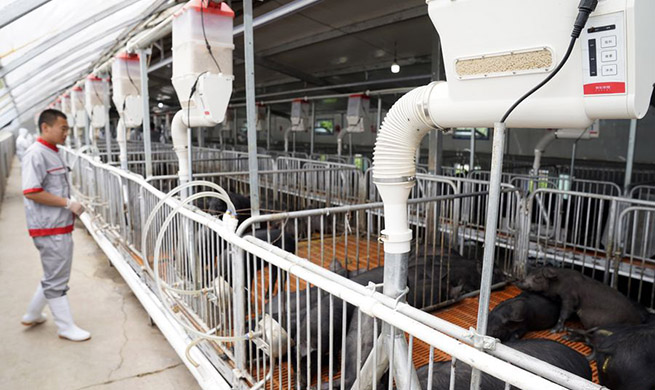LHASA, Dec. 8 (Xinhua) -- Tibetan Opera finally had the chance to stun audiences at the China Theatre Festival that closed in east China's Fuzhou in November, 10 years after it was inscribed in the UNESCO intangible cultural heritage list.
"It shows that the value and charm of the ancient art are still relevant, even outside Tibet and among those who don't speak Tibetan," said Bamdien Wangjo, head of the Tibetan opera troupe in southwest China's Tibet Autonomous Region.
Tibetan opera combines talking, singing, acting, dancing and literature, and has a history of over 600 years. It is regarded as a "living fossil" of Tibetan culture.
Based on folklore, legends and Buddhist classics, traditional plays are usually staged on wheat-threshing floors, pastures and open floors in gardens and forests during the daytime. Without any curtains or lighting, performers wearing masks perform alongside drums and cymbals.
"As time changes, people don't have that much spare time and only succinct and clear plots can attract more people," Bamdien Wangjo said.
His play "The Love of the six-string guitar" is only 2 hours and 10 minutes long. Besides the signatory resounding and vigorous vocals, the audience can also appreciate unique ethnic elements of Tibetan dress and dancing. The number of mask-wearing performers has also been minimized, allowing the audience can see more facial expressions. The stage effects include snowflakes, wind, and vivid garden settings that add more flavor for the audience.
The play tells the story of a Tibetan serf girl and son of a noble family who in love because of a six-string guitar. Their love is doomed due to identity disparity but they manage to spend their twilight years together thanks to the democratic reform that happened in Tibet 60 years ago.
Since its debut in 2016, the play has been staged over 100 times for over 50,000 people.
Despite the declining influence of Tibetan operas, the protection and inheritance of Tibetan operas have been stepped up over the past decades. The government-funded Tibetan opera troupe was established as early as in the 1960s.
In 2006, Tibetan opera was included in the first batch of national-level intangible cultural heritages, three years before its recognition by the UNESCO.
To mark the 10th anniversary of its UNESCO listing, the troupe is driving the "modernization" of traditional operas, by integrating them with advanced stage technologies, using digital means for filing and spread, and creating modern plays.
"Creating a new play usually takes two years, and needs an up-front investment of moren than 2 million yuan (about 284,000 U.S. dollars). But new plays are more modern and are easy to be accepted by the masses," said Bamdien Wangjo.
He has been working in the troupe for 24 years and is the first Tibetan opera artist to receive the Plum Blossom Prize, the top theatre award in China.
"It's not only a personal honor but more importantly, the status and influence of Tibetan operas as a whole is elevated," he said.
Besides the troupe, the autonomous region has 153 folk Tibetan opera performing groups. The regional culture department said the central and local governments have invested nearly 50 million yuan in its protection and inheritance, and another 24 million yuan in the construction of related facilities.
Tibet now supports 12 national inheritors with a subsidy of 20,000 yuan a year, and 15 regional inheritors with 10,000 yuan a year.
"We will receive 1.5 million yuan in subsidies from the government as long as we put on 60 performances next year," said Penpa Sinoh, head of a folk opera team in Lhasa. He said the days of his group members running restaurants and driving taxis to support themselves are over.
Thanks to the booming tourism industry, the troupe does not have to depend on government subsidies to make ends meet. In November, 28 performers in Penpa Sinoh's group were invited to give touring performances in Beijing, Tianjin, Chengdu and other cities. When the tour ended, each of them had earned about 7,000 yuan.
"With the support from the government and market, we are confident to pass along the heritage," Penpa Sinoh said.

















